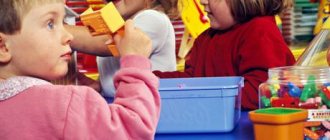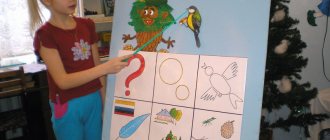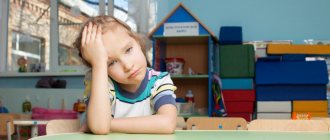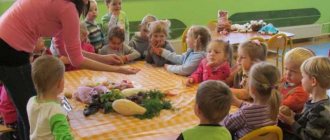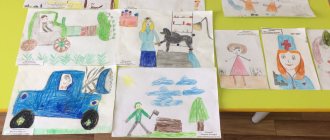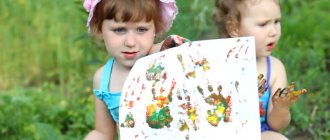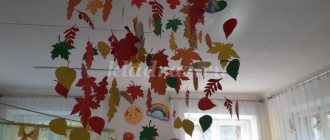plan for summer recreational work at a preschool educational institution, material on the topic
Section 1Summer job analysis for 2020
During the summer health campaign in kindergarten in 2015, 90 preschool children were covered. By May 25, long-term plans for the summer health campaign were drawn up. In each age group, starting from June 1, the schedule of classes has been changed, which includes activities aimed at improving health, physical, environmental development, as well as developing skills and habits of safe life as a means of personal protection. The entire kindergarten has been switched to summer mode. Corners for parents included medical and pedagogical information, life safety, and current information.
One of the areas in which the teaching staff of the kindergarten worked was the creation of health-preserving conditions for the purpose of improving the health and hardening of preschool children.
A child health system created in kindergarten, including:
- physical education;
- health work;
- hardening (using natural factors, as well as special methods and techniques);
- correction of existing developmental abnormalities (flat feet, poor posture)
confirmed its effectiveness this year.
In May, teachers of all groups carried out diagnostics of the physical development of children, starting from the age of three, and measured anthropometric data. At the end of the summer period, repeated diagnostics were carried out, the results of which showed an improvement in indicators. The attendance of children during the summer period was 60-70%.
Physical education included physical education and sports activities, gymnastics, games and entertainment, holidays, and outdoor leisure activities. Hardening took place using natural factors: air, water, air baths. The following activities were actively used: finger gymnastics, visual arts, work with stencils and mosaics.
The physical education diagnostics carried out at the beginning of the year also show an improvement in indicators in all sections.
Consultations were held for parents: “Holidays with children in the summer”, “Recommendations for walking in the summer”.
Thus, in the kindergarten, conditions were created for preserving the health, improving the health and strengthening of preschool children.
The next direction in which the teaching staff worked was the formation of an environmental culture among preschoolers.
All work in this direction was carried out in the following sections:
- cognitive activity;
- Practical activities;
- visual activity;
- play activity.
Much attention was paid to educational and experimental activities. This knowledge was presented to children through targeted walks, special conversations, entertainment, experimental activities, and work in flower beds and corners of nature.
Thus, teachers sought not only to expand children’s environmental knowledge, but also to form an environmental culture. Of course, in three months it is impossible to say with certainty that this problem has been completely solved. Therefore, we plan to continue working in this direction next year. But there are already positive results.
The third, big task that the teaching staff worked on was the development of skills and habits of safe life.
The solution to the problem was carried out in three directions:
- Traffic Laws;
- everyday situations;
- Fire safety.
During the summer, conversations and games were held to help children master practical skills and acquire skills in this direction.
During the summer, a series of practical and theoretical classes on life safety was conducted. “What can cause a fire”, “Matches are not a toy for children”, “What can harm others.” A consultation was organized for parents: “Child and the Road.”
In the summer, administrative and economic activities were carried out in full swing. Playgrounds are provided with sand. Cosmetic repairs were carried out in the groups. During the summer, new flower beds and green spaces appeared on the territory of the kindergarten.
Thus, the kindergarten team believes that the assigned tasks have been fully achieved.
Section 2
1. Creation of health-preserving conditions in kindergarten for the purpose of improving the health and hardening of preschool children.
2. Formation of ecological culture among preschool children.
3. Development of skills and habits of safe life.
2.1. Educational work
N
| Activities | Time spending | Responsible | |
| 1. | Transfer of kindergarten to summer mode. | June | Manager |
| 2. | Planning summer recreational work of preschool educational institutions. | June | Art. teacher |
| 3. | Motor activity. | During the summer | FC teacher |
| 4. | A series of practical and theoretical classes on life safety. | During the summer | Educators |
| 5. | Environmental and labor education. | During the summer | Educators |
| 6. | Cognitive activity:
| During the summer | Educators |
| 7. | Visual activities:
| During the summer | Educators |
| 8. | Holiday: "Children's Day". | June 1st | Educators |
| 9. | Thematic day: “Russia Day” | June 10th | Art. teacher, educators |
| 10. | Intellectual and sports entertainment “Dad Can!” | June 16 | Physical education teacher, educators |
| 11. | Preparing scenarios and plans | June | specialists |
2.2. Physical education and health work
| N | Activities | Time spending | Group | Responsible |
| Hardening | ||||
| 1. | Taking baths: Sunny; Air. | Daily | All groups | Educators |
| 2. | Walks | Daily | All groups | Teachers, assistant teacher |
| 3. | Sleep in a well-ventilated area. | Daily | All groups | Help teachers teacher |
| 4. | Walking barefoot. | Daily | All groups | Educators |
| 5. | Performing physical activity (warm-ups, a set of exercises, running) | Daily | All groups | Teachers, assistant teacher |
| 6. | Carrying out routine processes in the fresh air. | Daily | All groups | Educators |
| 7. | Washing feet. | Daily | All groups | Teachers, assistant teacher |
| 8. | Gargling with boiled water. | Daily | Senior groups | educators |
| Physical development | ||||
| 1. | Diagnosis of the level of physical fitness of children. | first week of June | Kindergarten groups | Educators |
| 2. | Morning exercises. | daily | All groups | Educators |
| 3. | Physical education classes. | 3 times a week | All groups | FC teacher Educators |
| 4. | Sport games. | According to the plan of the physical education teacher | Senior groups | FC teacher Educators |
| 5. | Sport competitions. Relay races. | |||
| 6. | Outdoor games | Every day according to the teachers' plan | All groups | Educators |
| 7. | Physical entertainment. | According to the plan of the physical education teacher | All groups | FC teacher |
| 8. | Mini tourism. | According to the teachers' plan | Senior groups | Educators |
| Holidays and entertainment | ||||
| 1. | "Let's welcome summer!" | June | Senior groups | Educators |
| 2. | Entertainment “Fun Starts” | July | Senior groups | FC teacher |
| 3. | "Bye, summer!" (holiday) | August | All groups | Educators |
| Corrective and preventive work | ||||
| 1. | Correction and prevention: flat feet; poor posture. | According to the plan of the physical education teacher | All groups | FC teacher |
2.3. Environmental and labor education
| N | Activities | Time spending | Group | Responsible |
| Cognitive activity | ||||
| 1. | Conversations. | According to the teachers' plan | All groups | Educators |
| 2. | Didactic games. | According to the teachers' plan | All groups | Educators |
| 3. | Story-based role-playing games. | According to the teachers' plan | All groups | Educators |
| 4. | Ecological experiments. | According to the teachers' plan | Senior groups | Educators |
| 5. | "Environmental Experts" (quiz) | June July August | All groups | Art. teacher |
| Visual activities | ||||
| 1. | Independent creativity. | According to the teachers' plan | All groups | Educators |
| 2. | Children's drawing competitions: “Drawings on asphalt” “Let’s save you, Nature” | July August | Senior groups | Art. teacher, educators |
| Practical activities | ||||
| 1. | Observations: flower garden; surrounding society; adult labor; nature; weather. | According to the teachers' plan | All groups | Educators |
| 2. | Work activity: flower garden; plot. | According to the teachers' plan | All groups | Educators |
| 3. | Series of practical exercises: “Ecological trail” | According to the teachers' plan | All groups | Educators |
| 4. | Competitions: best flowerbed; best sand building; Competition for the best crafts made from vegetables and fruits. | June July August | All groups | Educators |
2.4. Methodical work
| N | Activities | Time spending | Responsible |
| Work with personnel | |||
| 1. | Development and approval of a plan for educational and methodological work of the institution | June | Art. teacher |
| 2. | Carrying out activities in accordance with the educational and methodological work plan of the institution. | During the summer | Art. teacher |
| 3. | Development and approval of educational programs in accordance with Federal State Educational Standards | June August | Art. teacher |
| 4. | Development and approval of educational programs in accordance with the Federal State Educational Standard | June August | Art. teacher |
| 5. | Development and approval of the annual plan for the 2020 – 2020 academic year in accordance with the Federal State Educational Standard | June August | Head, Art. teacher |
| 6. | Final teacher council with summing up the results of the work for the 2015-2016 academic year and approval of the plan for summer recreational work, daily routine, distribution of activities during the summer period | 30.05.2016 | Head, Art. teacher |
| Consultations | |||
| 1. | Planning summer health work. | June | Art. teacher |
| 2. | Watch out, sun! | June | Educators |
| 3. | Forms of hardening and improving the health of children in the summer. | July | Art. teacher |
| 4. | Protecting the life and health of children in the summer. | June | Educators |
| 5. | Preparing kindergarten for the new school year | August | Manager |
| 6. | Organization of children's leisure in the summer, observance of physical activity in groups | July | Art. teacher |
| 7. | Interaction and forms of work with parents during the summer | July | educators |
| 8. | Features of a summer walk | August | educators |
2.5. Working with parents
| N | Activities | Time spending | Responsible |
| Stand information | |||
| 1. | Compliance with SaNpiN requirements in the summer | June August | Art. teacher |
| Consultations | |||
| 1. | Health work: Organization of health work in the summer Advice for parents | June June | educators |
| 2. | Environmental education: What is environmental education for preschoolers | July | educators |
| 3. | Labor education: All possible work of preschoolers in the flower garden | August | educators |
| 4. | PPD: Child and road | June | educators |
| 5. | Preparation of booklets for parents: “This is interesting”, “Advice from experts” | Summer period | Art. educator, specialists |
| Information in the parent's corner | |||
| 1. | GCD grid for summer | June | Educators |
| 2. | life safety fundamentals | August | Educators |
2.6. Fundamentals of life safety for children and adults
| N | Activities | Time spending | Group | Responsible |
| 1. | Rules of the road: A series of games and conversations; Mini excursions; Observations; Didactic games Drawing competition: “How I cross the street”; Entertainment: “Traffic Light” | According to the teachers' plan June August | All groups | Educators |
| 2. | Everyday situations: Didactic games and conversations (How not to behave in nature?; Tablets - what are they? etc.) | According to the teachers' plan | All groups | Educators |
| 3. | Fire safety: Didactic games and conversations (Matches are not a toy for children; Forest fires; What can cause a fire). Exhibition of works: “Fire is a friend, fire is an enemy.” Entertainment "KVN" | According to the teachers' plan June August | All Groups Senior groups | Educators |
2.7. Improving the qualifications of educators. Preventative work
| N | Activities | Time spending | Responsible |
| Briefings | |||
| 1. | Protecting the life and health of children. | June | Manager |
| 2. | Fundamentals of life safety for children and adults. | June | Art. teacher |
| 3. | Fire safety rules. | June | caretaker |
| 4. | Access control in preschool educational institutions. | June | Manager |
| Consultations for educators | |||
| 1. | Physical education and health work in the summer with preschool children. | June | FC teacher |
| 2. | Providing first aid to children in the summer. | June | Manager |
| 3. | Hardening children in the summer. | July | Art. teacher |
| 4. | Organization of leisure activities with children and parents | July | Art. teacher |
| Prevention and control of infectious diseases and helminthiases. | June | Manager | |
| Consultations for junior teachers | |||
| 1. | Compliance with SaNPiN in kindergarten. | June | Manager |
| 2. | Features of sanitary and hygienic cleaning in summer | ||
| Control | |||
| 1. | Compliance with SaNPiN. | During the summer | Head, Art. teacher, caretaker |
| 2. | Drinking regime, adherence to regime moments | ||
| 3. | Analysis of teachers’ plans, documentation | ||
| 4. | Carrying out briefings, checking the condition of the territory and the safety of removed material | ||
| 5. | Storage of perishable products. | ||
| 6. | Hardening. | ||
Section 3
Administrative and economic work
| N | Activities | Time spending | Responsible |
| 1. | Carry out cosmetic repairs to groups. | June August | Educators |
| 2. | Providing sand for playgrounds. | Spring-summer period | caretaker |
| 3. | Landscaping of the territory of the preschool educational institution. | May June | Educators |
| 4. | Monitoring equipment in group play areas. | Summer period | caretaker |
| 5. | Repair of verandas on the territory of the kindergarten. | May | caretaker |
| 7. | Drying carpets, mattresses, pillows, blankets. | June July | ml. educators |
| 8. | Providing first aid kits to all groups | Summer period | Caretaker, teachers |
| 9. | Preparing equipment for watering flowers | Summer period | caretaker |
Grid of thematic weeks
June 1st week – Child in the human world 2nd week – Flower week 3rd week – Magic week 4th week – Zoological week
July 1st week - Young pedestrians 2nd week - Vitamin week 3rd - Experimental 4th week - Sports (games and fun)
August 1st week – Alone with nature 2nd week – Fairy tales 3rd week – Morning of joyful meetings 4th week – Connoisseurs
JUNE
| Topic of the week | Days of the week | Content |
| I Week Child in the human world | 1st Child's Day | Conversation “Why is this day called that?” Poster information for parents “Children’s Rights” Observation of the weather. D/i “Collect a picture of a flower” I/u “Throw it up and catch it” “Hit it on the floor (ground)” D/i “What color is it” |
| 2 Sports Day | Review of the album “Sport” Conversation “Sport improves health” I/u “We are athletes” P/u “Sorcerer” “Traps with a ball” I/u “What for what” I/u “Throw a ring” “Hit the target” Finger gymnastics | |
| 3 Day Toys | Game miniatures - description of your favorite toy Examination of the exhibition of soft toys D / and “Name it affectionately” “The fourth odd one” Conversation “The history of the appearance of toys” (made of wood, straw, rags, clay whistles) Manual labor from waste material and paper “I will give a friend ..." P/n "We are funny guys" | |
| 4 Health Day | Conversation “What does it mean to be healthy” - meeting with Dr. Aibolit. S/r “Polyclinic” “Pharmacy” Consultation for parents “Medicines in the house and their storage” I/u “Who will quit next” Observation of plants on the site. What do they need water for? Reading "Moidodyr" by K. Chukovsky D/i "It is possible - it is not possible" based on the pictures of the book "Safety" (about hand hygiene) P/i "The fastest" "Strongmen" | |
| 5 Fairy Tale Day | Meeting with a kind storyteller Reading Russian folk tales “Teremok” Theatrical production “Teremok” for children of the younger group D/i “From what fairy tale” - reading excerpts from Russian folk tales P/i “Sorcerer” “Geese, geese” Modeling based on a fairy tale “ 3 bears" I/u "Come up with a new fairy tale" | |
| II Week Flower week | 1 Flower Day | Looking at the album “Garden Flowers” N/p and “Flowers” Observing the flowers in the flowerbed D/i “I know 5 flowers” Learning “Blue bell...” P/i “I was born a gardener” Labor – weeding the weeds in the flowerbed |
| 2 Gardening Day | Examination of a set of postcards D/i “What is the name of this flower” “What is needed for working in the garden” Observation of flowers in a flower bed Watering and loosening a mini flower bed on the site Finger gymnastics “Buds” P/i “Don’t stay on the ground” | |
| 3 Day of Chamomile | Composing flowers from a mosaic Observation “Friends of Flowers” - moths, butterflies, bees (how they collect nectar) I/u “Flowers” - dandelions and the sun D/i “Find by description” P/i “I was born a Gardener” D/i “Collect a flower” - cut pictures” Drawing “Chamomile” | |
| Day 4 Flower meadow | Review of the book “Dunno in the Flower City” I/u “Important Flowers” (aimed at preventing poor posture) Walking with a bag on my head Observing the flowers in the central flowerbed I/u “Butterflies and a flower” I/u “Look for the same one” Game - improvisation “Butterflies and Moths” Application “Beautiful Flower” | |
| 5 Day of Miracles | Telling the fairy tale “Thumbelina” Theater on the flannelograph “Thumbelina” Conversation “Why does a bee fly to a flower” Wonderful aroma - finding a flower with the most pleasant smell Memorizing “Carrying a Dandelion...” Relaxation exercise “Dandelion Field” I/u “Song of the Bell” Work with with a floral stencil Poke drawing “Multi-colored meadow” | |
| III Week Magic week | 1 Day of Experiment | Experimenting "Colorful water". Meeting with Hottabych P/i “Sunshine and Rain” D/i “What has changed” Conversation “What would happen if there was no water” Ways to save water P/i “Water” |
| Day 2 Vitamin | Conversation about vitamins in vegetables and fruits Decorating porridge with berries from jam or pieces of marmalade Reciting the poem “The housewife once came from the market” D/i “Test the taste of fruits and vegetables” “Wonderful bag” Labor in nature: weeding and loosening. I/u “Healthy” jumping and running, jumping S/i “Hospital” | |
| 3 Artist Day | Examination of objects for drawing (watercolor, gouache, felt-tip pens) Drawing in different ways (finger, palm, candle, etc. Observation of the actions of the teacher “What comes out of a blot” Experiments of children with liquid gouache (blot-gram) Improvisation game “Blot” - image different figures with gestures, facial expressions. D/i “Find out and name what is drawn” | |
| 4 Day of Samodelkin | Examination of objects laid out on the table by the teacher from threads and paper. Observation of the teacher’s actions Competition “The best craft” I/u “Get through the postcard” “Where did the coin hide” “Why doesn’t water spill from the glass?” Applique made of woolen threads “Magic flowers” P/i “Tiliram” Games with beads – laying out a pattern | |
| 5 Day of Magic | Considering an exhibition of objects that are contrasting in color, size, thickness, width, texture, etc. D/i “Say the opposite” P/i “Dwarfs and giants” I/u “Looking for contrasts in the environment” Observation of plants, trees, toys, etc. Finger gymnastics “2 kittens met” The little finger of the right hand touches the little finger of the left hand (2 foals, 2 puppies, 2 tiger cubs, 2 bulls) Leisure sports “In the Land of the Giant” | |
| IV Week Zoological week | Day 1 Call of the Jungle | Conversation about wild animals Looking at the album “Animals” Writing a story about wild animals Reading M. Prishvin’s story “Fox Bread” D / and “When it happens” P / and “At a bear in the forest” |
| 2 Day of the Furry Animal | Consideration of the book by Stepanov V. “The Fluffiest” - reading poems to the pictures D/i “Guess” riddles about animals P/i “Fox in the chicken coop” “Cat Kotofey” Modeling based on the fairy tale “Winter quarters of animals” S/i “Who with what treated" - acquaintance with the ways of feeding animals in the forest I/u "Depict a sly fox..." - improvisation, plastic movement in accordance with the depicted animal C/p game "Zoo" | |
| 3 Day of Fishing | Mini-excursion “Fishing” Examination of the album “Sea Curiosities” P/i “Fisherman”, “Fishing Rod” Drawing “In the underwater kingdom”, “Colorful fish” D/i “Who swims, who crawls” finding from pictures Labor - make a fishing rod | |
| 4 Zoo Day | Looking at the album Reading the poem “Elephant” “Reception at Aibolit” I/u “Turtles” - crawling “Kangurats” - squatting jumps “Ostriches” - walking, stopping on one leg Breathing gymnastics “King of Animals” Working with the stencil “Animals of Africa” Handmade “Turtle” from walnut shells Dramatization of the fairy tale “Zayushkina’s hut” S/r and “Zoo” | |
| 5 Bird Day | Examination of the album “Birds of our lands” D/i “Recognize by voice” Observation of sparrows and titmice P/i “It flies or does not fly” Singing the song “Lark” Manual labor “Lark” (origami) “Color the bird” |
JULY
| Topic of the week | Days of the week | Content |
| I Week Young pedestrians | 1 Day of Transport | Examination of the album Comparison of a bus and a trolleybus, a tram and a train using visual pictures Construction from a large building set P/i “Cars” S/r and “Bus” D/i “Find out by description” Conversation “How to behave on a bus” |
| 2 Day of Construction Transport | Looking at the album Comparing a truck and a Kamaz Construction from a large building set Playing in the sandbox “Highway” Looking at cars in pictures. D/i “Is this cargo or passenger?” P/i “Chauffeurs” Conversation “Driver, take your time” about the rules of conduct for pedestrians and drivers in the city | |
| 3 Road Day | Conversation “Situations on the road” S/r and “Traffic Inspectorate Post” Learning poems about traffic lights. D/i “Traffic Light” Application “Bus and Truck” of children’s choice | |
| 4 Traffic Light Day | Memorizing “Pedestrian, pedestrian, remember about the crossing...” Conversation “How to cross the road correctly” Examination of the stand “Road Rules” Screen folder for parents “Caution, pedestrian” D/i “Do’s and don’ts” Acquaintance with service signs P/i “Drivers and traffic lights” | |
| 5 Day of traffic rules | Meeting of children with Pinocchio, who almost got hit by a car because he doesn’t know how to cross the road correctly. Conversation with children’s stories about the rules for crossing the road. Examination of road signs “Prohibitory”, “Warning”, “Information” Puppet show “Parsley on the street” D /and “Which is faster” S/r and “A trip to the forest” P/and “Chauffeurs” | |
| II Week Vitamin | 1 Fruit and Vegetable Day | Conversation “Fruits and vegetables are good for health” Examination of the album “Fruits and vegetables growing in our area” D/i “Guess”, “What color is that” Drawing “My favorite fruit or vegetable” P/i “Garden - round dance » S/r and “Vegetable shop with dummies” |
| 2 Labor Day | Conversation “Professions” Observing the work of a janitor. D/i “Who needs what for work?” A wonderful bag - you can recognize it by touch. Observation in the flower garden. Weeding, watering, loosening. I/o to maintain balance “Sunflowers” Modeling according to plan Preparing costumes for the dramatization of the fairy tale “Turnip” | |
| 3 Fruit Day | Conversation “What does a plant eat” Examination of a bulb with feathers, roots Experimentation 1 Onion in water and without water 2 Onion in the sun and in the dark Summing up: light and water are needed in moderation D/i “Test the taste” - fruit - vegetable Improvisation emotional manifestations depending on the taste of the products (lemon, banana, strawberry, onion) Sketch “Delicious emotions” P/i I was born a gardener - running in circles | |
| 4 Day of Purity | Conversation “Cleanliness is the key to health” Folder - screen in the parent corner “Cleanliness is the key to health”, “Poisonous berries” D/i “Taste-color-shape” Conversation “What is good for which organ” Vitamins: A - carrots, onions, tomatoes - improves vision C- cabbage, green onions, lemon, currants gives strength, improves appetite Breathing exercise “Fragrant strawberry” I/u “In the gooseberry thickets” - walking with high knees, stepping over objects P/ and “Entertainers” | |
| 5 Vitamin Day | Preparation of attributes for the fairy tale "Turnip" Dramatization of the fairy tale "Turnip" Meeting with the queen of the Vitamin Country "Fruit salad" - a treat with the help of parents Finger gymnastics "Orange" I/u "Compare by size" Examination of pumpkin, zucchini "Garden giant" D/i " Guess it" | |
| III Week Experiments | 1 Water Day | Conversation “The importance of water in the life of humans and plants, the water expanses of Russia” Drawing, appliqué, manual labor “Underwater world” Experiments with water P/i “Sun and Rain”, “Fishing” Experiment “What floats - what sinks”, “ Which will dry faster” (fabric - paper) Summing up |
| 2 Nature Day | Conversation “What is under our feet”, “Living Earth” Observation of vegetation on the lawn, in the flowerbed D/i “What is it called” “What color is this plant” “Find the same one” Sketch “Flowers have blossomed” P/i “Centipede » Experiment “What happens to roots without soil” Consideration of the album “Inhabitants of the Soil” I/u “Grasshoppers” “Worm” - crawling E/i “I know 5 insects” | |
| 3 Clay Day | Examination of toys: haze, clay whistles D/i “What is made of what” Experiment: what kind of clay is it? (dry) (diluted) And/u “What will happen” - modeling from clay, fruits - vegetables - dishes Reflections on the topic “Does anything grow on clay?” - learn to summarize an experiment with dry clay P/i “Along the hummocks” I/u “Across the swamp bog” - walking with high knees | |
| 4 Sand Day | Observation of sand in containers, wet - dry Experiments: “What kind of sand is it?” (sprinkling, sifting, comparing temperatures) S/p “Treasure Search” toys and various objects are hidden in advance in the sandbox Playing with sand Relaxation exercise “I’m lying in the sun” Finger gym. “Drawing on the sand” P/ and “Carousel” I/u “Barefoot on the sand” - prevention Leisure – We are friends with sports (flat feet) | |
| 5 Air Day | Conversation “Everyone needs fresh air” Experiment “Where the air hides” with a glass of water: Celof bubbles. with a bag - blowing With a balloon - when inflated, smoothly glides through the air P/i with a balloon “Don’t drop - tossing” Conversation “Friends of Man” - about plants that purify the air Observation of indoor plants Finger.gym. “Bird” Handmade from paper “Miracle - fan” P/i “Planes”, “Blow up a bubble” Breathing exercise “Warm - cold wind” | |
| IV Week Sports, games and fun | 1 Ball Day | A parcel from the Fairy of Flowers in gratitude for your care in the flower kingdom - watering, weeding (inflatable ball inside) P/n “Don’t drop it” — passing over your head “My funny ringing ball” “Dodgeball” I/u “Whose ball bounces higher” — throwing on the floor, hitting Comparison: Which ball bounces better? Inflatable or rubber? And/u “Grandfather beat, but didn’t break it” - hitting, dribbling the ball with 1 hand “Ride right into the goal” “Great Robin Hood” - throwing plastic balls at a distance Ball games. |
| 2 Hoop Day | Consideration and comparison: large - medium - small hoop P/i “Find your home” - orientation by size I/u “Roll the hoop and don’t drop it” P/i “Homeless hare” (left without a hoop - at home) Finger.gym. “We met” Relaxation exercise “I’m lying in the sun” - in a hoop” | |
| 3 Board Game Day | Examination of an exhibition of non-game games Conversation about the preservation of games and their use Comparison of dominoes and lotto, logical cube, house with geometric figures D/i “Guess and find in lotto” D/i “Name the color and shape” - logical cube Manual work “Making a flower lotto” (by means of appliqué on a ready-made base) P/i “Tea, tea to the rescue” “Monkeys” Ball school: “Toss - catch”, “Knock down the pin” | |
| 4 Sports Day | Conversation “Movement is life” Listening to music “March” by D. Kovalevsky P/i “Dexterous skillful” “Moon and sun” S/r and “Athletes” “Rock climbers” - climbing a gymnastic wall “Climbing mountains” - walking on overhead board I/u “Hit the target” Sports relay race with running, jumping, climbing | |
| 5 Tourism Day | Conversation “Who are tourists and travelers” Mini-tourism Conversation “Getting ready for a hike” - what to take - thought. I/u “Riding bicycles” D/i “Find by description” - trees are landmarks for movement I/u “On one leg to the birch tree” “With a backpack behind my back” - walking with a gymnastic stick under my hand P/i “Who quicker" |
August
| 1 week “Alone with nature” | 1 Ant Day | Note the organization of life in an anthill and the industriousness of insects. Excursion to an anthill Examine a large anthill, find the “roads” to the small ones, follow the ant paths where the ants go for food, what “burdens” they carry into the house. To form in children an understanding of the great benefits that ants bring to the forest, to evoke a caring attitude towards the “orderlies” of the forest. S/r and “Anthill” P/i “We won’t say where we were, but we’ll show you what we did” |
| 2 Wildlife Day | Conversation “What surrounds us?” “What benefits do plants provide?” Manual labor - cleaning your plot, watering flowers, loosening the soil Drawing “My Planet” Collecting leaves for the herbarium P / and “Mousetrap” “Owl” | |
| 3 Day of Medicinal Plants | Show the variety of flowers in the flowerbed, note the main difference - reproduction, variety of shapes and colors. Consider plantain. Leaf shape, its healing properties. Harvesting method: cut with scissors, dry in a dark, ventilated area. What happens if you dry it in the sun in a closed jar, in a pile? (humus). D/i “Which plant is the leaf from?” | |
| 4 Day of Wind | Observing the strength of the wind. D/i “How can you determine whether there is wind or not without leaving your home?” Reading an excerpt from a poem by A.S. Pushkin “Wind, you are a mighty wind...” See how the wind drives the clouds across the sky. Looking at a cloud, fantasizing “What does it look like?” P/i “The sea is agitated” | |
| 5 Meadow Day | Note that there are plants growing in the meadow that need a lot of light; distinguish and name some of them (clover, meadow geranium, mouse pea). Teach to appreciate the beauty and freedom of meadows filled with the aroma of herbs. Examine the plants, determine the characteristics of the stem, leaves, flowers, and compare them. | |
| Week 2 of Fairy Tales | Day 1 “We are wizards” | Experimental work “Multi-colored water” Meeting with Hottabych P/i “Sorcerer” D/i “What has changed?” Conversation “Ways to save water” S/r “Magic Wand” |
| 2 Day of Games and Fun | S / r and “Dreamers” P / and “Bullet” Relay game “Jolly Threes” Conversation “We play by the rules” I / u “Keep your balance” Come up with a new game | |
| 3 Day of Blotography | Examination of objects for drawing Drawing “Magic Blot” Children’s experiments with liquid gouache P / and “Paints” Get a new color | |
| 4 Day of Focus | Examination of objects laid out on the table by the teacher from threads and paper Learning tricks “Where did the coin hide” S/r and “I am a magician” | |
| 5 Rainbow Day | Teach to see the beauty of nature, the ability to appreciate and protect it. Show a way to recreate an artificial rainbow. D/i “Name the colors of the rainbow” When does a rainbow appear in the sky? Look at the rainbow in the picture. | |
| Week 3 “Morning of joyful meetings” | 1 Day of Care | Meeting children and showing concern for them. Cooperative games. Thematic conversation “Who are we, children?” Asphalt drawing competition “Human World”, “Fantasies and Hobbies”. Looking at a magazine of drawings about real and fantastic professions. Game "I really want" |
| 2 Friendship Day | Meeting of friends. Reading B. Zakhoder “We are friends” Interview “Tell me about your friend”, “What a friend should not be?” Game “Recognize a friend by description” D/i “Which color of the rainbow would you give to your friend and why?” Singing songs by V. Shainsky “The world is like a colorful meadow”, “When my friends are with me” Proverbs and sayings about friendship. Conversation about people of different nationalities | |
| 3 Birch Day | Examining a birch tree in the kindergarten area. Coming up with riddles about the birch Singing the Russian folk song “Zemlyushka-chernozem” Drawing “Such different birches” Russian folk song “There was a birch tree in the field” Reading the fairy tale “Maryushka and the birch tree” D/i “Whose branch are the children from?” | |
| 4 Day of Physical Education | Conversation about summer sports. Game “Who knows more about summer sports” Examination of illustrations Sports leisure “Travel to Sportlandia” Drawing as desired. | |
| Day 5 Experimental | Soil is an important factor of life on earth. Consists of stone, clay, sand and humus. The higher the humus content, the greater the fertility of the site. In nature, everything is interconnected. Create artificially several types of soils with a predominance of one of the components. S/r and “We are experimenters” | |
| Week 4 With experts | 1 Berry Day | D/i “Guess the taste” “Edible - inedible” Reading the fairy tale “The Magic Pipe” Reading N. Pavlov’s “Strawberries” Conversation “Let’s go into the forest, we’ll find strawberries” Examination of a strawberry bush P/i “Edible – inedible” |
| 2 Bird Day | We watch birds while walking. The nests have already hatched chicks. Conversation about the life of birds. P/i “What material do birds build nests from?” “What birds do you know?” Reading by J. Rainis “Titmouse”, K. Ushinsky “Swallow” D/and “Recognize by Voice” | |
| 3 Sand Day | Observation of sand in containers (wet - dry) Experience “What kind of sand is it” pouring, sifting, comparing, temperature S/r game “Treasure Search” Games with sand | |
| 4 Air Day | Conversation “Everyone needs fresh air” Experiment “Where the air hides” P/n “Don’t drop it - throw it up” Conversation “Friends of Man” - about plants that purify the air Observation of indoor plants Manual labor “Miracle Fan” | |
| Day 5 Around the World | Examination of the globe Conversation “Countries of the World” Relay races with elements of basketball Learning rhymes S / r and “Around the world” P / and “Climbers” |
List of used literature
- Agapova I.A. Physical education and recreational work in preschool educational institutions. – Directory of senior preschool teacher. – 2008, N 7, p. 21
- Baranova V.N., Medvedeva L.A. Work with personnel in the summer. – Management of a preschool educational institution. – 2007, N 4, p. thirty
- Belyaeva I.V. Review competition for the best preparation for summer health work. — Directory of senior kindergarten teacher. – 2008, N 6, p. 31
- Borovleva A.V. Project method as a means of improving the quality of education. – Management of a preschool educational institution. – 2006, N 7, p. 76
- Volkova E.M. Features of working in different age groups in the summer. — Directory of senior kindergarten teacher. – 2008, N 6, p. 42
- Evdokimova E.S. Design technology in preschool educational institutions. – M.: Sphere shopping center, 2006, 64 p.
- Zheltikova-Vostroknutova T.M. Providing assistance to children with allergies due to insect bites. — Directory of senior kindergarten teacher. – 2009, N 6, p. 13
- Fadeeva T.V. Preparing for the work of preschool educational institutions in the summer. — Management of a preschool educational institution. – 2007, N 3, p. 50.
Middle group. Junior preschool age. Children 4 - 5 years old
Plan of summer health work in the middle group Plan of summer health work of the middle group “Fairy Tale” I. Educational and educational work 1. Speech development a) Visiting a fairy tale - reading, listening to recorded fairy tales b) Memorizing poems, songs, nursery rhymes. c) Guessing riddles d) Word games: “It’s me….
Plan of educational activities in the middle group on the theme of the week “Goodbye, summer, hello, kindergarten!” Topic of the week: “Goodbye summer , hello kindergarten!”
Goal: Continue to get acquainted with kindergarten as the child’s immediate social environment: subject environment, rules of behavior in kindergarten, relationships with peers. Complex of morning exercises – No. 1 (from 01.09….

